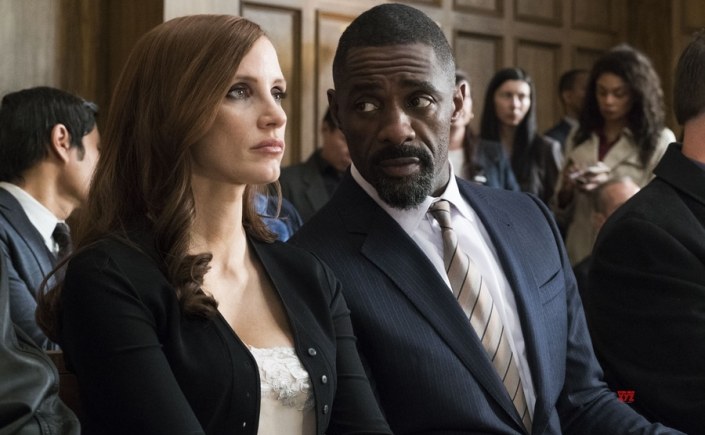
Photos by STXfilms.
Director: Aaron Sorkin
Starring: Jessica Chastain, Idris Elba, Kevin Costner, Michael Cera, Jeremy Strong, Chris O’Dowd, Bill Camp
When Molly Bloom, the eponymous “Poker Princess” of “Molly’s Game” was ready to have her memoir adapted for the screen, she knew exactly whom she wanted to write that translation: Aaron Sorkin. In retrospect, Bloom’s story of running the most exclusive underground poker game in the world seems like an obvious choice for the acclaimed screenwriter. Everything about “Molly’s Game” is classic Sorkin – the high-stakes legal situation, the unique look behind closed doors, and of course, a driven protagonist with an exceptional mind. The sole digressions from his modus operandi only make “Molly’s Game” all the better. While Molly Bloom is the writer’s typical astute heroine, this is the first time we’ve seen Sorkin focus on a female character, and he does a wonderful job with her. The more noticeable and newsworthy piece about “Molly’s Game” is that it’s a stunning directorial debut for Sorkin.
“What’s the worst possible thing that can happen in sports?” Molly Bloom (Jessica Chastain) opens the film asking this via voiceover, as we watch her (much) younger self gear up for a freestyle ski competition. This isn’t a typical competition, but rather the qualifying round of trials for the U.S. Olympic Team – and Molly’s on the cusp of overtaking her competitors. Crouching in a ready position at the top of the slope, she’s quite literally at the height of her potential. Her voice-over informs us that she’ll make the Olympic team. She’ll medal in the Games. She’ll attend a prestigious law school. She’ll found a startup to help female entrepreneurs. But shortly after pushing off, Molly fecklessly hits a pine bough, severing her boot from the ski as she flies through the air. In the moments she’s plummeting toward the ground for a landing she can’t possibly stick, we see that bright future extinguished. And we know the worst possible thing that can happen in sports.
From this point, the story becomes interspersed with present-day events. In the middle of the night, armed law-enforcement officers show up at Molly’s door, arresting her for running an illegal gambling operation. Though she closed-up shop in the world of poker two years prior, the feds have since found three members of the Russian mob connected through one of her infamous games. Destitute and facing the threat of incarceration, Molly turns to the virtuous lawyer Charles Jaffey (Idris Elba) for help. And she tells him everything.
The tour de force of Molly’s Game is the titular woman herself, propelled in equal parts by Sorkin’s writing and Chastain’s performance. A bombshell in low-cut dresses, with a crisp yet soothing tone, Molly Bloom is almost an anti-hero. Growing up, her father instilled in her a drive to succeed at whatever she attempts. It just so happens that she applies said drive to succeed in a morally-gray area. As Molly takes her first steps into the world of underground poker, assisting a real estate agent (Jeremy Strong) with his weekly gathering, we see the new players she invites are carefully handpicked to keep the ecosystem of the game in balance. Most of the newbs, like Brad the hedge fund manager (Brian D’Arcy James), are selected because they’re rife for exploitation by her star player (Michael Cera, playing a compound of celebrities like Tobey Maguire and Leonardo DiCaprio). Yet Molly does her best to prevent the “Brads” of the game from reaching total financial ruin, turning them away at times when a legal casino would nudge them to demise by offering more credit.
When Molly graduates from assisting poker games to running her own in New York – the ones for which she will eventually be prosecuted – she is ruthless in protecting the reputation and security of the enterprise. But never cruel. Molly is uninterested in humiliating or destroying the players who cross her; she only takes the actions necessary to ensure they will never do so again. Her admonitions are never accompanied by a brandished gun, thugs, or any form of violence. Only a verbal warning and fair consequences. Molly’s justice as a poker host makes it feel all the more unfair when the prosecutors of her case show no mercy – thus we can easily sympathize with her. Chastain plays the poker princess as a woman distant from those around her, seamlessly delivering Sorkin’s rapid-fire quips in a level, emotionless tone. But we still see Molly’s worry and uncertainty for her future peeking through the surface.
The story moves along as quickly as Sorkin’s dialogue. The alternating timelines are simple enough to follow, and effectively mesmerize us with the drama. One of Sorkin’s best moves as director is that he finds subtle ways to highlight how Molly is the only woman in a man’s world. Of course, in every poker scene for the first half of the film, she literally is the only woman in the room. But more than that – he shows us the uncomfortable moments she faces in her position. Multiple marriage proposals from players who claim they’re hopelessly in love with Molly make for good chuckles, but they also reveal how uncomfortable her job can be.
The one place in which “Molly’s Game” stumbles is Sorkin’s attempt at weaving in family drama. By the time a ghost from her past comes around to make amends at the end of the film, we’ve almost forgotten about Molly’s tragic family history. The entire picture flies by at a brisk, unyielding tempo, and this encounter harshly interrupts the inertia of that momentum. Nonetheless “Molly’s Game” is the gift of a commanding performance by Chastain, tied up with Sorkin’s touch as the bow on top.


